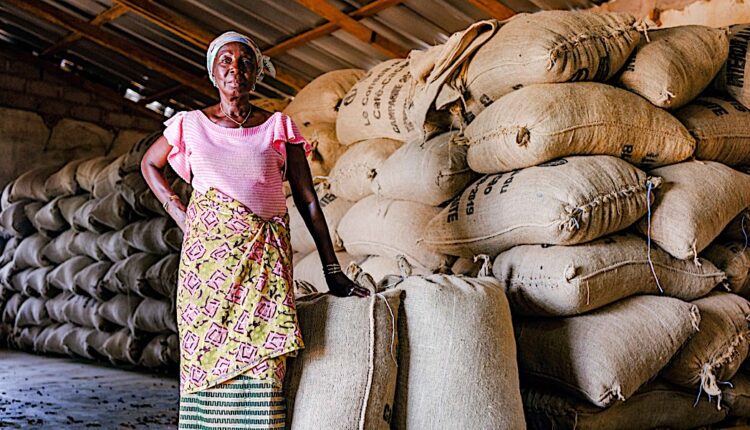World Bank Pushes Reforms In Ivory Coast Cocoa Sector
The World Bank says the Ivorian economy is in good shape but the government there must adapt and make changes in the cocoa sector.
The Ivorian economy has remained buoyant since the start of the year, posting one of the fastest growth rates in Africa.
This rate is projected to reach 7.2 % in 2019, compared to 7.4% last year. This was the finding of the ninth economic update for Côte d’Ivoire published by the World Bank.
The bank said this sound performance is due primarily to regained private sector momentum, which had slowed in 2016 and 2017. It said the private sector is once again the main engine of growth in the country but expressed concern about the cocoa sector.
Entitled ‘Au pays du cacao, comment transformer la Côte d’Ivoire’ (‘Cocoaland, How to Transform Côte d’Ivoire’), the report noted that government reforms aimed at improving the business climate encouraged enterprises to step up investments in 2018.
The study points out, however, that, unlike the 2012-2015 period when the entire private sector expanded, the current recovery has revolved around the telecommunications, agribusiness, and construction sectors.
Furthermore, contributions from the external and public sectors have declined owing to the deterioration in the terms of trade and the fiscal adjustment initiated by the authorities.
“The outlook remains positive in the short and medium term, with, among other things, inflation that is under control, a government deficit that is expected to fall, and a gradual increase in exports,” explained Jacques Morisset, World Bank Programme Leader for Côte d’Ivoire and lead author of the report.
“Several risks could, however, alter these projections, particularly those pertaining to the fragility of the global economic situation and financial markets and to the 2020 presidential elections that could prompt a cautious approach among economic actors and consumers.”
The study calls on the Ivorian Government to focus in particular on managing its accounts because, although the government deficit fell from 4.5% to 4% of GDP between 2017 and 2018, this adjustment essentially involved major budget cuts, including a decline in public investment, rather than higher tax revenue collection.
As Côte d’Ivoire’s economic model is built around the agricultural sector, particularly cocoa, of which the country is the leading global producer, the report focuses on the cocoa industry and paints a worrying picture.
Although harvests have quadrupled since 1960 to over 2 million tonnes in 2018, the living conditions of producers have not fundamentally changed. In 2015, 54.9% of them were living below the national poverty line.
Furthermore, this increased production has had a detrimental impact on Côte d’Ivoire’s natural capital, with the alarming destruction of forests that currently cover roughly 3 million hectares compared to 12 million in 1960.
According to the study, these challenges also provide an opportunity as they spur Côte d’Ivoire to revamp the entire cocoa value chain in order to transform its economy.
The bank proposes three approaches: leveraging technology to increase yields and shift from extensive to intensive growth; setting up traceability systems to offer consumers a guarantee of responsible cocoa production; and developing the local processing industry.
“Côte d’Ivoire has a unique opportunity to improve the living conditions of its cocoa producers and create jobs along the processing chain while restoring its natural capital,” said Coralie Gervers, World Bank Country Director for Côte d’Ivoire, Benin, Guinea, and Togo.
There is an urgent need to modernize the cocoa sector and ensure that it becomes a true driver of inclusive growth.
As previously reported by C&CI, the efficient operation of the cocoa sector in Côte d’Ivoire is adversely affected by the poor state of transport infrastructure, which urgently needs to be improved.
Apart from low farmer incomes, a lack of investment and pests and diseases the cocoa sector in Côte d’Ivoire faces major challenges arising as a result of the poor quality of the logistics system in the country.
The road network is in poor shape, which adds to transport costs and causes delays. Many of the trucks used to transport cocoa are old and poorly maintained and cannot make a good speed. This results in increased fuel use and higher emissions and environmental impact.
The authors of a recent report from Amsterdam University of Applied Sciences said that if these other issues in the logistics chain could be addressed, significant benefits would accrue.
The report, ‘Towards a sustainable agrologistics in developing countries: the case of cocoa’s supply chain in San Pedro region/Côte d’Ivoire,’ by Abdel El Makhloufi, Miguel Mujica Mota, Dick van Damme and Victor Langenberg, suggests that Côte d’Ivoire needs to focus on a number of key areas.
These include the inadequate physical conditions of roads in the country; the inefficiency of freight transport by road; unnecessary checkpoints along the road, resulting in delays and congestion; and the low speed of the trucks on the roads.
- Ghana May Postpone Delivery of 250,000 MT of Cocoa Due to Shortage - April 12, 2024
- Ghana Cocoa Farmgate Price To Go Up By 50% - April 4, 2024
- More African Processors Shutdown As Cocoa Shortage Deepens - March 17, 2024
